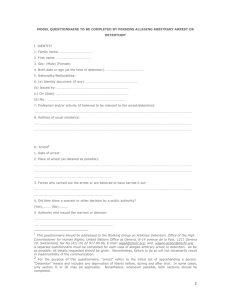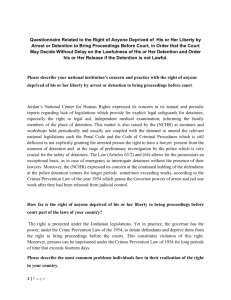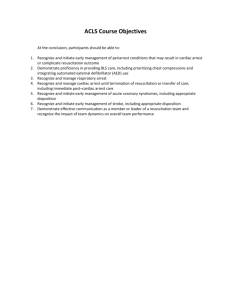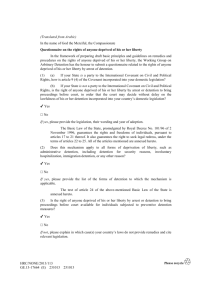Warrant powers - Australian Human Rights Commission
advertisement
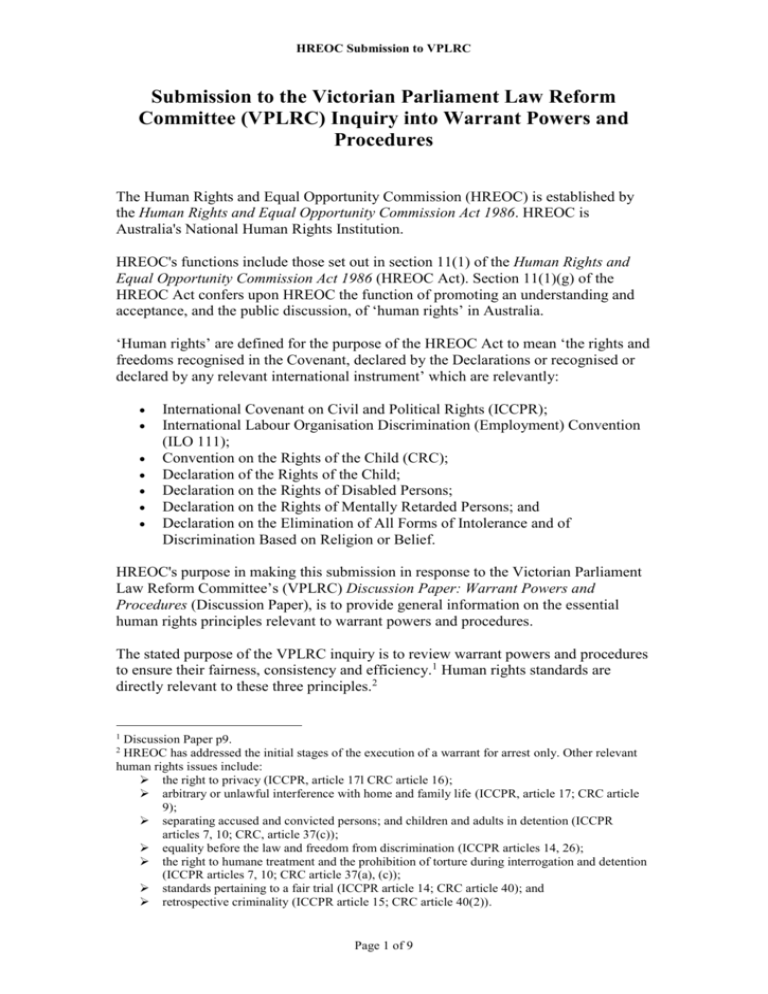
HREOC Submission to VPLRC Submission to the Victorian Parliament Law Reform Committee (VPLRC) Inquiry into Warrant Powers and Procedures The Human Rights and Equal Opportunity Commission (HREOC) is established by the Human Rights and Equal Opportunity Commission Act 1986. HREOC is Australia's National Human Rights Institution. HREOC's functions include those set out in section 11(1) of the Human Rights and Equal Opportunity Commission Act 1986 (HREOC Act). Section 11(1)(g) of the HREOC Act confers upon HREOC the function of promoting an understanding and acceptance, and the public discussion, of ‘human rights’ in Australia. ‘Human rights’ are defined for the purpose of the HREOC Act to mean ‘the rights and freedoms recognised in the Covenant, declared by the Declarations or recognised or declared by any relevant international instrument’ which are relevantly: International Covenant on Civil and Political Rights (ICCPR); International Labour Organisation Discrimination (Employment) Convention (ILO 111); Convention on the Rights of the Child (CRC); Declaration of the Rights of the Child; Declaration on the Rights of Disabled Persons; Declaration on the Rights of Mentally Retarded Persons; and Declaration on the Elimination of All Forms of Intolerance and of Discrimination Based on Religion or Belief. HREOC's purpose in making this submission in response to the Victorian Parliament Law Reform Committee’s (VPLRC) Discussion Paper: Warrant Powers and Procedures (Discussion Paper), is to provide general information on the essential human rights principles relevant to warrant powers and procedures. The stated purpose of the VPLRC inquiry is to review warrant powers and procedures to ensure their fairness, consistency and efficiency.1 Human rights standards are directly relevant to these three principles.2 1 Discussion Paper p9. HREOC has addressed the initial stages of the execution of a warrant for arrest only. Other relevant human rights issues include: the right to privacy (ICCPR, article 17l CRC article 16); arbitrary or unlawful interference with home and family life (ICCPR, article 17; CRC article 9); separating accused and convicted persons; and children and adults in detention (ICCPR articles 7, 10; CRC, article 37(c)); equality before the law and freedom from discrimination (ICCPR articles 14, 26); the right to humane treatment and the prohibition of torture during interrogation and detention (ICCPR articles 7, 10; CRC article 37(a), (c)); standards pertaining to a fair trial (ICCPR article 14; CRC article 40); and retrospective criminality (ICCPR article 15; CRC article 40(2)). 2 Page 1 of 9 HREOC Submission to VPLRC This submission focuses on the principles relevant to the execution of arrest warrants only. HREOC has not conducted an analysis of the relevant Victorian laws or practices relating to the exercise of powers under a warrant. Rather HREOC sets out some of the general principles that may be relevant to laws relating to the apprehension and arrest of a person under a warrant.3 The structure of this submission is as follows. 1 2 3 4 5 6 7 8 9 General human rights framework relevant to warrants.......................................... 2 Prohibition on arbitrary arrest and detention ......................................................... 4 Right to know the reasons for arrest ...................................................................... 5 Right to see a lawyer upon arrest ........................................................................... 6 Right to be informed promptly of any charges ...................................................... 7 Right to a prompt appearance before a judge to challenge the lawfulness of arrest and detention .......................................................................................................... 7 Compensation ........................................................................................................ 8 Convention on the Rights of the Child .................................................................. 8 Conclusion ............................................................................................................. 9 1 General human rights framework relevant to warrants Warrants for the arrest and detention of individuals require a balancing of citizens’ civil and political rights and the public interest in the effective administration of justice that may require limitation of these rights. Consideration of the scope of any limitation of rights should be informed by the international instruments to which Australia is a party. Although the State of Victoria is not a direct signatory to the international instruments to which Australia is a party, the obligations undertaken by the Commonwealth are nonetheless applicable to Victoria. Article 50 of the International Covenant on Civil and Political Rights (ICCPR), for example, provides that the ICCPR’s guarantees ‘extend to all parts of federal States without any limitations or exceptions.’ 3 For a detailed discussion of the rights and principles relevant to arrest, detention and the right to a fair trial see Lawyers Committee for Human Rights, What is a fair trial?, March 2000 at http://www.humanrightsfirst.org/pubs/descriptions/fairtrialcontents.htm. See also, Amnesty International, Fair Trials Manual at www.amnesty.org.ailib/intcam/fairtrial/indxftm_a.htm. Much of the research for this submission is drawn from these two sources. Page 2 of 9 HREOC Submission to VPLRC This means that the Commonwealth is obliged to guarantee that the laws and activities of State and Territory governments conform with the ICCPR.4 For example, the United Nations Human Rights Committee that hears complaints under the First Optional Protocol to the ICCPR found a breach of human rights by the Commonwealth where the impugned law was a Tasmanian law rather than a Commonwealth law. Thus, whilst any breach is attributed to the Commonwealth, it is directly referable to the actions of a State. The most relevant of international instruments for the purpose of this submission are the ICCPR and the Convention on the Rights of the Child (CRC). Those two treaties set out the following pertinent fundamental principles: 1. The prohibition on arbitrary arrest and detention (ICCPR, article 9(1); CRC, article 37(b)). In the case of children, detention should be a measure of last resort and for the shortest appropriate period of time (CRC, article 37(b)), 2. The right of persons who are arrested to be promptly informed of charges brought against him or her (ICCPR, article 9(2)) 3. The right to challenge the lawfulness of detention (ICCPR, article 9(2)-(3); CRC, article 37(d)) 4. In the case of children, the right to legal and other assistance (CRC, article 37(d)) 5. The right to compensation in the case in the event of unlawful arrest or detention (ICCPR, article 9(5)) In addition to the primary obligations under the ICCPR and the CRC, a series of internationally agreed standards have been developed to assist in interpreting the meaning of these broad treaty provisions and to provide guidance as to the manner in which the arrest of adults and children ought be properly executed. Those standards include the following: Basic Principles for the Treatment of Prisoners, December 1990; Standard Minimum Rules for the Treatment of Prisoners, 1955; Body of Principles for the Protection of All Persons under Any Form of Detention or Imprisonment, (Body of Principles), December 1988; Basic Principles on the Role of Lawyers (Basic Principles on Lawyers); UN Rules for the Protection of Juveniles Deprived of Their Liberty, December 1990; United Nations Standard Minimum Rules for the Administration of Juvenile Justice (the Beijing Rules). 5 Where applicable, we will refer to these standards to give meaning to the treaty obligations under the ICCPR and the CRC. 4 5 Toonen v. Australia (488/92), 31 March 1994 at para. 16.36. See http://www.ohchr.org/english/law/index.htm for copies of these instruments. Page 3 of 9 HREOC Submission to VPLRC 2 Prohibition on arbitrary arrest and detention Article 9(1) of the ICCPR sets out the general prohibition on arbitrary arrest and detention as follows: Everyone has the right to liberty and security of person. No one shall be subjected to arbitrary arrest or detention. No one shall be deprived of his liberty except on such grounds and in accordance with such procedure as are established by law. The corollary to the fundamental right to liberty is protection against arbitrary or unlawful detention.6 This basic guarantee applies to everyone, whether held in connection with criminal charges, or, for example, in connection with mental illness, vagrancy or immigration control.7 Arrest and detention must be on grounds and procedures according to law.8 Procedures governing arrest and detention must conform not only to domestic law, but also to international standards.9 Arrest, detention or imprisonment may only be carried out by people authorised for that purpose.10 An arrest or detention which is lawful may nonetheless be arbitrary under international standards. The Human Rights Committee has explained that the term ‘arbitrary’ in article 9(1) of the ICCPR is not only to be equated with detention which is ‘against the law’, but is to be interpreted more broadly to include elements of inappropriateness, injustice and lack of predictability.11 The deprivation of liberty permitted by law should not be “manifestly unproportional, unjust or unpredictable, and [that] the specific manner in which an arrest is made must not be discriminatory and must be able to be deemed appropriate and proportional in view of the circumstances of the case”.12 Thus international law states that detention will be arbitrary because of elements of injustice, inappropriateness, unreasonableness or indeterminacy or if it is ‘not necessary in all the circumstances of the case’ or not a proportionate means to achieving a legitimate aim’.13 6 Amnesty International Fair Trials Manual, section 1.1 available at http://www.amnesty.org/ailib/intcam/fairtrial/indexftm_a.htm 7 Human Rights General Comment 8, para 1. 8 See also article 6 of the African Charter, article XXV of the American Declaration, Articles 7(2) and 7(3) of the American Convention, article 5(1) of the European Convention. 9 The European Court has stated that the phrase ‘in accordance with a procedure prescribed by law’ in article 5(1) of the European Convention refers to domestic law, but that the domestic law itself ‘must be in conformity with the principles expressed or implied in the [European] Convention’. Kenmach v France (No.3) , (45/1993/440/519), 24 November 1994. 10 Principle 2, Body of Principles. (Amnesty Paper, section 1.4) Not sure which body of principles they are referring to. 11 Albert Womah Mukong v Cameroon, (458/1991), 21 July 1994, UN Doc. CCPR/C/51/D458/1991, at 12. 12 Lawyers Committee for Human Rights, What is a fair trial?, March 2000, citing Manfred Nowak, U.N. Covenant on Civil and Political Rights, CCPR Commentary (N.P. Engel, Arlington: 1993) at 244. 13 Human Rights Committee, A v Australia, Communication No. 560/1993, UN Doc CCPR//59/D/560/1993, 30 April 1997, para 9.2. Page 4 of 9 HREOC Submission to VPLRC International law also provides guidance on who is the appropriate agent to make an arrest. Principle 2 of the Body of Principles provides that : Arrest detention or imprisonment may only be carried out by people authorized for that purpose. Principle 9 further provides: The authorities which arrest people, keep them in detention or investigate their cases may exercise only the powers granted to them under the law. The use of these powers must be subject to supervision by a judicial or other authority. While the Body of Principles are not binding standards, they are, nonetheless, the product of international consensus and therefore provide a good guide as to the standard of conduct that is required by States Parties under the ICCPR. They clearly provide that only persons who are properly authorised by law may arrest and detain others. Further, any arrest or detention must be supervised by courts or other independent authorities. 3 Right to know the reasons for arrest Article 9(2) of the ICCPR provides that: Anyone who is arrested shall be informed at the time of his arrest of the reason for his arrest and shall be promptly informed of any charges against him.14 Precisely what is required by this treaty obligation has been fleshed out in jurisprudence of the Human Rights Committee and of various regional human rights courts. It is important to note that article 9(2) provides that reasons for the arrest must be given ‘at the time of arrest’. 15 The reasons must be specific and must include a clear explanation of the legal factual basis for the arrest and detention.16 There must be sufficient information to permit the accused to challenge the legality of their 14 See also Paragraph 2(B) of the African Commission Resolution; principle 10 of the Body of Principles; article 7(4) of the American Convention; article 5(2) of the European Convention; principle 11(2) of the Body of Principles. 15 Article 9(2) of the ICCPR, principle 10 of the Body of Principles, and Paragraph 2(B) of the African Commission Resolution. The Human Rights Committee found that there was a violation of article 9(2) of the ICCPR in a case in which a lawyer for a local human rights organization was held for 50 hours without being informed of the reasons for his arrest, Portorreal v Dominican Republic (188/1984) 2 Sel. Dec. 214. The European Court has stated that ‘intervals of a few hours’ between the time of the arrest and interrogation – which would lead the detainee to understand the reasons for the arrest – ‘cannot be regarded as falling outside the constraints of time imposed by the notion of promptness in article 5(2). Fox, Campbell and Hartley, (18/1989/178/234-236), 30 August 1990, para 42. 16 Nowak at 255. The Human Rights Committee considered that there was a violation of article (92) of the ICCPR in a case where an accused was informed at the time of his arrest only that he was wanted in connection with a murder investigation. For several weeks he was not informed in detail of the reasons for his arrest, the facts of the crime for which he was arrested nor the identity of the victim. Kelly v Jamaica, (253/1987), 8 April 1991, Report of the HRC, (A/46/40), 1991, para 5. Page 5 of 9 HREOC Submission to VPLRC detention.17 Further, the reasons for arrest should be given in a language that the person understands.18 These requirements are further reflected in internationally agreed standards as follows: Anyone who is arrested shall be informed at the time of his arrest of the reason for his arrest and shall be promptly informed of any charges against him. Body of Principles, principle 10 Any person shall, at the moment of arrest and at the commencement of detention or imprisonment, or promptly thereafter, be provided by the authority responsible for his arrest, detention or imprisonment, respectively, with information on and an explanation of his rights and how to avail himself of such rights. Body of Principles, principle 13 4 Right to see a lawyer upon arrest Principle 5 of the Basic Principles on Lawyers and principle 17 of the Body of Principles specifically provide that when a person is arrested, charged or detained he or she must be promptly informed of the right to legal assistance of his or her choice. Article 7 of the Basic Principles on Lawyers stipulates that governments ought to ensure that all persons arrested or detained should have access to a lawyer within 48 hours of arrest or detention. Principle 15 of the Body of Principles states that a detainee must be able to communicate with counsel within a ‘matter of days’, while the Human Rights Committee has stated that ‘all persons who are arrested must immediately have access to counsel’.19 The Body of Principles and Basic Principles on Lawyers also provide that if an arrested person cannot afford his or her own counsel, the relevant authorities must provide a lawyer free of charge if the interests of justice so require.20 However, the common law of Australia has not fully recognised this principle. To the extent that it has been recognised, it is in specific circumstances relating to criminal proceedings for a serious offence.21 17 The European court of Human Rights has held that article 5(2) of the European Convention means an arrested person should “be told, in simple, non-technical language that he can understand, the essential legal and factual grounds for his arrest, so as to be able, if he sees fit, to apply to a court to challenge its lawfulness …” However, the Court also held that it was not necessary to give a full description of the charges at the moment of arrest (Fox, Campbell and Hartley (18/1989/178/234-236), August 30, 1990, para 40). 18 European Convention, article 5(2); Human Rights Committee General Comment No. 13/21 of April 12, 1984, para 8; African Commission Resolution, Paragraph 2(B), Body of Principles, principle 14; ICC Statute, article 67(1)(a). 19 Concluding Observations of the Human Rights Committee, Georgia, UN Doc. CCPR/C.79 Add.75, April 1, 1997. These comments were made in the context of recommendations made by the Human Rights Committee to the State of Georgia to reduce the incidence of torture and/or cruel, inhuman or degrading treatment or punishment. 20 Principles on the Role of Lawyers, principle 6; Body of Principles, principle 17(2). 21 In Dietrich v. The Queen, the majority of the High Court held that where an indigent accused who is charged with a serious offence and who is not legally represented applies for a stay, adjournment or Page 6 of 9 HREOC Submission to VPLRC 5 Right to be informed promptly of any charges Every person arrested or detained has the right to be promptly informed of any charges against them.22 Being informed of charges allows people arrested or detained to challenge the lawfulness of their detention and if facing trial on criminal charges, to begin the preparation of their defence. 6 Right to a prompt appearance before a judge to challenge the lawfulness of arrest and detention Everyone deprived of their liberty has the right to take proceedings before a court to challenge the lawfulness of their detention.23 Article 9(3) of the ICCPR refers specifically to the rights of a person arrested or detained on a criminal charge, who ‘shall be brought promptly before a judge or other officer authorized by law to exercise judicial power and shall be entitled to trial within a reasonable time or to release’.24 Article 9(4) of the ICCPR provides for the right to habeas corpus, the right of anyone deprived of liberty by arrest or detention to ‘take proceedings before a court, in order that that court may decide without delay on the lawfulness of his detention and order his release if the detention is not lawful’. If such a proceeding is initiated, the detaining authorities must produce the detainee before the relevant court without unreasonable delay. The court examining the lawfulness of detention must decide ‘speedily’ or ‘without delay’ and must order the release of the detainee if the detention is not lawful.25 postponement in legal proceedings, the application should be granted ‘in the absence of exceptional circumstances’, until legal representation is available. Dietrich v. The Queen [1992] HCA 57 at para. 40 per Mason CJ & McHugh J; (1992) 177 CLR 292. 22 Articles 9(2) and 14(3) of the ICCPR, Articles 7(4) and 8(2)(b) of the American Convention, article 5(2) and 6(3)(a) of the European Convention, principle 10 of the Body of Principles, Paragraph 2(B) of the African Commission Resolution Articles 20(2) and 21(4) of the Yugoslavia Statute, Articles 20(2) and 21(4)(a) of the Rwanda Statute. 23 See article 9(4) of the ICCPR, principle 32 of the Body of Principles, article XXV of the American Declaration, article 7(6) of the American Convention, article 5(4) of the European Convention. 24 See also European Convention, article 5(3); American Convention, article 7(5); African Commission Resolution, Paragraph 2(C); and ICC Statute, article 59(2)-(3); Body of Principles, Principles 11, 38 and 39. 25 Amnesty International, Fair Trials Manual, p22. principle 32 of the Body of Principles; UN Commission on Human Rights, Commission Resolution 1992/35. Page 7 of 9 HREOC Submission to VPLRC 7 Compensation Anyone who has been the victim of unlawful arrest or detention shall have an enforceable right to compensation. International Covenant on Civil and Political Rights, article 9(5) Each State Party to the present Covenant undertakes to ensure that any person whose rights or freedoms as herein recognized are violated shall have an effective remedy, notwithstanding that the violation has been committed by persons acting in an official capacity. International Covenant on Civil and Political Rights, article 2(3)(a) Read together, these articles of the ICCPR make clear that the Covenant contemplates remedies for breaches of the rights and freedoms protected by the Covenant, including compensation for arbitrary or unlawful arrest. Article 2(3)(b) and (c) go on to clarify that any such remedy, including a claim for compensation, should be determined by a competent judicial, administrative or legislative authority and shall be enforceable. 8 Convention on the Rights of the Child The CRC, to which Australia is a party, contains principles relevant to warrant provisions affecting children including the following provisions. No child shall be deprived of his or her liberty unlawfully or arbitrarily. The arrest, detention or imprisonment of a child shall be in conformity with the law and shall be used only as a measure of last resort and for the shortest appropriate period of time. Convention on the Rights of the Child, article 37(b) Every child deprived of his or her liberty shall have the right to prompt access to legal and other appropriate assistance, as well as the right to challenge the legality of the deprivation of his or her liberty before a court or other competent, independent and impartial authority, and to a prompt decision on any such action. Convention on the Rights of the Child, article 37(d) Children are also treated as a special class of persons under the ICCPR. Article 10(2)(b) of that treaty provides that accused juveniles should be separated from adults and brought before a tribunal as speedily as possible. The United Nations Committee on the Rights of the Child has expressed concern at the length of detention of children on arrest and during investigation (pre-trial detention), as well as the length of sentences, both generally and in specific circumstances.26 The Beijing Rules note that following the apprehension of a juvenile, ‘[a] judge or other competent official or body shall, without delay, consider the issue of release’.27 26 27 UNICEF, Implementation Handbook for the Convention on the Rights of the Child, 2002, p551. Beijing Rules, Rule 10(2) Page 8 of 9 HREOC Submission to VPLRC The Committee on the Rights of the Child does not accept that deprivation of liberty should be used for children in need of protection.28 The Committee emphasised that the safeguards regarding to detention apply to all forms of deprivation of liberty, not just detention in the context of juvenile justice: Concern was expressed at the placement of children in institutions, under a welfare pretext, without taking into due consideration the best interests of the child nor ensuring the fundamental safeguards recognized by the Convention, including the right to challenge the decision of placement before a judicial authority, to a periodic review of the treatment provided to the child and all other circumstances relevant to the child’s placement and the right to lodge complaints.29 The Beijing Rules expand on the right to legal assistance for children: ‘Throughout the proceedings the juvenile shall have the right to be represented by a legal adviser or to apply for free legal aid where there is provision for such aid in the country’ (rule 15(1)). 9 Conclusion The human rights principles outlined in this submission are not intended to provide a comprehensive summary of the rights relevant to all forms of warrant powers. However it does address some of the principles that should be considered by the VPLRC’s review of arrest warrant powers and procedures in Victoria. If there are specific provisions or further issues on which the VPLRC would like further advice, HREOC would be happy to provide more detailed comment. 28 UNICEF, Implementation Handbook for the Convention on the Rights of the Child, 2002, p553 Committee on the Rights of the Child, Report on the tenth session, October/November 1995, CRC/C/46, para 228) 29 Page 9 of 9

